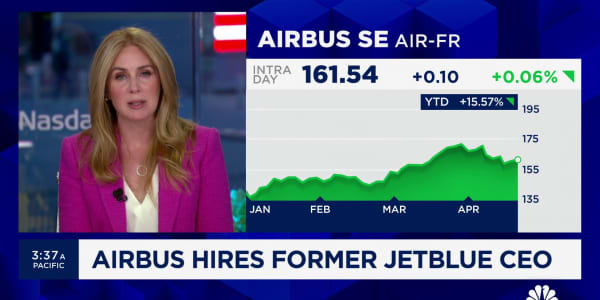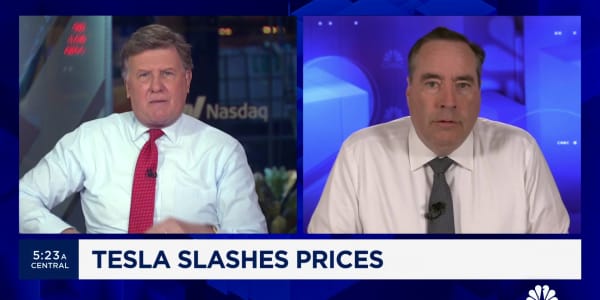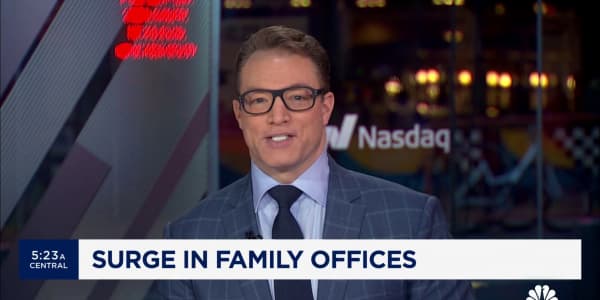The best of times, the worst of times
We've made our list and checked it twice: this week's CNBC Executive Edge winners and losers.
So what did it take to land a coveted, or dreaded, spot?
Well, you could steer your company to gamble big where others have lost. Or you could be a pop icon with marketing nerve. Or you could do something really daring, like stake your business on the kindness of the People's Republic of China. And of course, you could do something really, really embarrassing, involving 40 million of your shoppers.
To see what we mean, read on.
Winner: Argentina
There's an old joke in the oil and gas business that if you want to lose money, you should invest in projects in Argentina. But in true dark-horse fashion, Argentina—quick to nationalize anything that is making money—topped of best-performing global stock markets for 2013, as tracked by CNBC, with the country's MERVAL index rising by nearly 84 percent this year. Don't get too excited just yet: No one will cry for you if you get with a bet on Argentina based on this recent outperformance.
Loser: Target (and 40 million of its customers)
This is something to make any merchant shudder: a breach of customer credit cards that could send shoppers to competitors. And it happened during the biggest shopping season of the year. Yikes!
Target says it suffered a breach of 40 million credit and debit card accounts between November 27 and December 15, and the chain urges anyone who shopped at its stores during that period to check for unauthorized charges. With the bulk of holiday shopping still ahead for most consumers, experts wonder how many will steer clear of Target due to this issue. Similar problems at other retailers, however, have not typically led to wholesale customer desertion.
Quote:
"I'm usually in Target once a week, but around this time of year? I've been there three times this week. ... I probably won't go there for a few weeks until they figure this out."—Target customer Helen Lane of Newport News, Va.
Beyoncé
Any executive in charge of marketing knows how easy it is to waste vast sums on campaigns that turn into duds. So how about scoring a TD by spending, well, nothing.
That's the Madison Avenue soul-searching question raised by singer Beyoncé's stunning success in selling her new album without the usual marketing drumroll. The self-titled album was released on Apple's iTunes without advance notice, and sales immediately went through the roof. Some say marketing as we knew it is dead (see below); others say someone who has used past successful marketing campaigns (not to mention a great deal of talent) to become as famous as Beyoncé can accomplish this trick, but she's close to one-of-a-kind.
Quote:
"Marketing as we knew it is dead."—Saatchi & Saatchi CEO, Kevin Roberts
Loser: Taper naysayers
The drumroll has finally ended: The Fed's taper is starting. The Federal Open Market Committee announced Wednesday that it is trimming its $85-billion-per-month bond-buying program to $75 billion.
The program, meant to keep long-term interest rates low to stimulate the economy, had been expected to begin winding down in September, but at that point the FOMC felt conditions were still not quite good enough.
Now that the taper is beginning, though slowly, all eyes will be on the reaction of the financial markets. Some experts have attributed much of the stock market's dramatic gains in recent years to the Fed's easy-money policy, and they have warned stock could dive with this prop removed. Others say the strengthening economy would continue to support stocks after the taper started.
Quote:
"I think ... logically, this is what they had to do. ... In this economy, you have to pull back from the most extreme monetary policy in a century. So I think it's overdue. I'm glad to see it."—David Kelly, managing director at JPMorgan Funds
Winner: Twitter
Remember all those worries that the Twitter IPO would flop like Facebook's did? Well, the Twitter handlers were careful not to repeat Facebook's mistakes, and the result has been quite stunning. Too stunning, according to some analysts.
Twitter shares have soared nearly 120 percent since the November IPO. Does that mean the IPO was underpriced, causing the social networking firm to leave money on the table? Or is this a bubble?
A growing number of analysts, while generally liking the company, are embracing the feeding-frenzy theory. As the market awaits earnings data that won't be out for a month or so, the stock has been hit with a number of downgrades.
Quote:
"We just have a tough time paying 300 times EBITDA right now."—SunTrust analyst Robert Peck
Loser: AOL
One of the toughest executive decisions is wondering how long to hold out hoping that a few tweaks will turn around a money-losing venture. Business professors will have a new case study now that AOL has finally given up on its Patch local news sites.
The idea that local news can attract readers who will attract advertisers is a Holy Grail of the news business and has been the undoing of many a news executive. AOL CEO Tim Armstrong hatched Patch in 2007 while an executive at Google, then convinced AOL to buy it after he took over there.
Many observers, including AOL shareholders, felt Armstrong clung to Patch with a kind of blind paternal love. Fortunately for Armstrong, the rest of his AOL turnaround strategy has done well, and the stock is up 45 percent this year.
Quotes:
"Mr. Armstrong's big dream had become a nightmare that wore out his shareholders and set off a proxy fight in 2012. ... The insurgents lost the war, but turned out to be right."—David Carr, The New York Times
"At the end of the day, could Patch have been run better? We don't know. ... Patch was one of the big bets that we made, among others, and I still believe local will be a big opportunity whether it is Patch or someone else."—Armstrong
Winner: Mikhail Khodorkovsky
Pardoned oil tycoon Mikhail Khodorkovsky, former head of Russian oil giant Yukos, may have been from prison after 10 years, but he will be walking out into a Russia where President Vladimir Putin has solidified his power base with politics and economics controlled by the president's inner circle. Not to mention the fact that Russia's most famous prisoner was probably pardoned in part as a pawn in a bit of pre-Olympics marketing to brush up the country's image.
Makes no difference: You get out of prison in a stunning turn of events that no one predicted—most Russia watchers expected Khodorkovsky to remain in prison as long as Putin remained in power (so maybe forever)—and you definitely get a nod as a weekly winner.
Loser: The People's Bank of Bitcoin
The second shoe dropped on bitcoin owners Wednesday, with the price plummeting to below $600 from a high of more than $1,200 in November, after the People's Bank of China barred third-party payment outfits from using the virtual currency. The central bank had earlier warned about volatility and potential fraud.
The third-party agencies provide clearing services for bitcoin exchanges. Without them, trading in China will be much more difficult, undermining what is believed to be the largest market for the currency. Chinese bitcoin exchanges said they expect to continue operating.
Quote:
"Bitcoin exchanges are legal ... so our business model is still valid but we're under some pressure in terms of being able to work with third-party payment companies. So we're looking for alternatives."—Bobby Lee, CEO of BTC China, the world's largest bitcoin exchange
Winner: BlackBerry
interim CEO John Chen expects the smartphone company to by 2016, adding that the new partnership with Foxconn will help the handset division make money.
"[We] need to see the growth in FY 2016. ... It cannot be just from cost and containment and so forth, although we seem to be doing pretty [well] there," Chen told CNBC in an exclusive interview on Friday.
The company struck a five-year partnership with Taiwan-based manufacturer Foxconn Technology to develop and manufacture handsets, starting with a lower-end device built for Indonesia and other emerging markets. Foxconn is also one of iPhone maker Apple's main suppliers.
Loser: The 99 percent (and the economy)
Why aren't your customers spending more? There may be various reasons, of course, but now you can add this to the list: Growing income inequality leaves them with less to spend.
A majority of more than three dozen economists surveyed last week said income inequality is undermining the U.S. economy. They note that wealthier people, who are benefiting from healthy raises and big stock market returns, spend less of their additional wealth than do low- and middle-income folk, who account for most consumer spending.
Quote:
"What you want is a broader spending base. You want more people spending money."—Scott Brown, chief economist at Raymond James
Winner or loser? (You decide): Obamacare
You've heard of the glass-half-full brand of optimism, but how about feeling good because the glass is a quarter full?
That, essentially, was the solace Obamacare supporters could take from a new CNBC All America Economic Survey out early this past week. It found that the number of Americans with positive views of the Affordable Care Act had declined, though only a little, from 29 to 26 percent, between September and December. That was when we had all the brouhaha over the plan's messed-up website. Negative attitudes rose just one percentage point to 47 percent, and neutral ones fell only two points to 11 percent.
In a on Friday afternoon, President Obama said more than half a million Americans enrolled in health insurance plans under Obamacare using the HealthCare.gov website during the first three weeks of December. That brings the total enrollments through state and federal marketplaces to more than 1 million people to date, based on rough estimates of updated state and federal data, according to a report from Politico.
But that a million people who might have bought Obamacare insurance may end up not signing up, because of persistent problems in getting a major alternative enrollment avenue working as designed. And 4 out of the 15 chiefs of Obamacare insurance marketplaces run by individual states and the District of Columbia have either since the botched Oct. 1 launches of their health exchanges.
Quotes:
"When it came to the health-care roll-out, even though I was meeting every other week with folks and emphasizing how important it was that consumers have a good and easy experience in getting the information they need, the fact is, it didn't happen in the first six weeks and since I'm in charge, we screwed it up."—President Obama
"Just complete frustration, to be honest with you. You go online, they're telling you you can do it. It doesn't work."—John DiVito, president of Illinois-based Web broker Flexible Benefit




